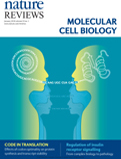|
| TABLE OF CONTENTS | |||||||||||||||||||||||||||||||||||||||||
| January 2018 Volume 19 Number 1 | |||||||||||||||||||||||||||||||||||||||||
| In this issue
| | |||||||||||||||||||||||||||||||||||||||
| |||||||||||||||||||||||||||||||||||||||||
 | |||||||||||||||||||||||||||||||||||||||||
| Advertisement | |||||||||||||||||||||||||||||||||||||||||
| |||||||||||||||||||||||||||||||||||||||||
| |||||||||||||||||||||||||||||||||||||||||
| Advertisement | |||||||||||||||||||||||||||||||||||||||||
| |||||||||||||||||||||||||||||||||||||||||
| REVIEWS | Top | ||||||||||||||||||||||||||||||||||||||||
| Regulation of heat shock transcription factors and their roles in physiology and disease Rocio Gomez-Pastor, Eileen T. Burchfiel & Dennis J. Thiele p4 | doi:10.1038/nrm.2017.73 Heat shock transcription factors (HSFs) regulate heat shock proteins in conditions of thermal stress, but they also control gene expression in other stress conditions, as well as in other contexts, including the regulation of cell proliferation and energy metabolism. HSFs are misregulated in various diseases, such as cancer and neurodegeneration, which underlines their important physiological roles. Abstract | Full Text | PDF | Supplementary information | |||||||||||||||||||||||||||||||||||||||||
Codon optimality, bias and usage in translation and mRNA decay Gavin Hanson & Jeff Coller p20 | doi:10.1038/nrm.2017.91 The uneven use of the synonymous amino acid codons in the transcriptome coupled with the relative concentrations of different tRNA species gives rise to non-uniform codon decoding rates by ribosomes, known as codon optimality. Codon optimality influences translation efficiency and fidelity, protein folding and mRNA decay. Abstract | Full Text | PDF | |||||||||||||||||||||||||||||||||||||||||
Biochemical and cellular properties of insulin receptor signalling Rebecca A. Haeusler, Timothy E. McGraw & Domenico Accili p31 | doi:10.1038/nrm.2017.89 Research over the past few decades has elucidated the biochemical mechanisms underlying insulin receptor signalling. Recent insights into the complexity of its temporal and tissue-specific regulation, which involves various combinations of signalling modules in different cell types, are shedding light on the pleiotropic effects of insulin action and the pathogenesis of insulin resistance. Abstract | Full Text | PDF | |||||||||||||||||||||||||||||||||||||||||
The emerging complexity of the tRNA world: mammalian tRNAs beyond protein synthesis Paul Schimmel p45 | doi:10.1038/nrm.2017.77 tRNAs exist as diverse species, including sequence isoforms and nuclease-generated fragments, which are further functionally diversified by base modifications and various protein interactions. Perhaps unsurprisingly, tRNAs are now being implicated in various cellular processes beyond protein synthesis per se, including in stress responses, proliferation, cell fate determination and tumorigenesis. Abstract | Full Text | PDF | Supplementary information | |||||||||||||||||||||||||||||||||||||||||
Ubiquitylation at the crossroads of development and disease Michael Rape p59 | doi:10.1038/nrm.2017.83 Ubiquitylation is a post-translational modification that modulates protein stability and regulates various cellular signalling pathways and cellular processes, including cell differentiation, proliferation and migration. Recent insights highlight its crucial role in development and how its deregulation is associated with several diseases. Abstract | Full Text | PDF | |||||||||||||||||||||||||||||||||||||||||
| |||||||||||||||||||||||||||||||||||||||||
| You have been sent this Table of Contents Alert because you have opted in to receive it. You can change or discontinue your e-mail alerts at any time, by modifying your preferences on your nature.com account at: www.nature.com/myaccount For further technical assistance, please contact our registration department For print subscription enquiries, please contact our subscription department For other enquiries, please contact our feedback department Springer Nature | One New York Plaza, Suite 4500 | New York | NY 10004-1562 | USA Springer Nature's worldwide offices: Macmillan Publishers Limited is a company incorporated in England and Wales under company number 785998 and whose registered office is located at The Campus, 4 Crinan Street, London, N1 9XW. © 2018 Macmillan Publishers Limited, part of Springer Nature. All Rights Reserved. |
 |









No comments:
Post a Comment